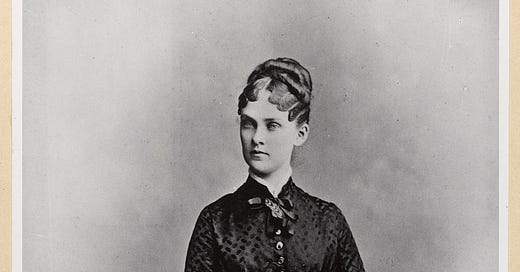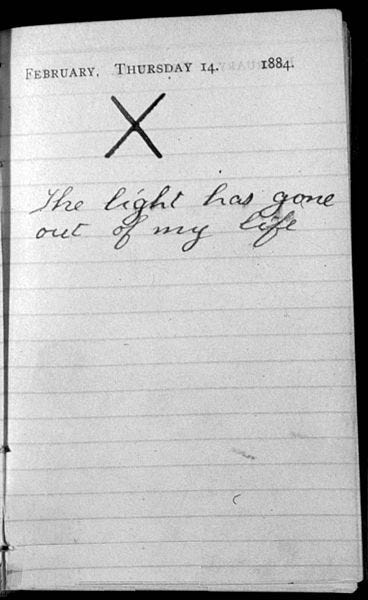Alice Hathaway Lee exuded grace and was full of energy. Enchanting, some said. She stood 5'7" and was slender, with blue-gray eyes and long, golden hair. Family members called her "sunshine." In so many ways, she was what Theodore Roosevelt was not.
History remembers Theodore as tough, an adventurer, unafraid. But in his earlier years, people described him with other adjectives. One college classmate said Theodore was "thin-chested, spectacled, nervous, and frail." He spoke in a high-pitched voice and, at times, erratically. His laugh, in his mother's words, was like a "sharp, ungreased squeak." And when he danced, "he danced as you'd expect him to dance if you knew him — he hopped."
Theodore met Alice on a weekend visit to the home of a Harvard classmate. It was October of 1878. Theodore was nineteen, and Alice was seventeen.
He was smitten, or maybe you could even say he fell in love at first sight. In either case, this is where the love story begins.
The pair spent the weekend hiking and dancing among friends, and they found time to spend alone. Teddy learned that he could talk to her about politics and poetry, and anything else on his mind.
He wrote of their first meeting: "As long as I live, I shall never forget how sweetly she looked, and how prettily she greeted me."
Theodore set his mind on being with her. In early 1879, he proposed.
Alice rejected him.
Though devastated, Theodore didn't stop pursuing, continuing to feel deeply in love with Alice. And Alice, who had grown close to Theodore's sisters, soon started to warm to the young man.
He proposed again the following year, eight months after his first proposal. This time, Alice accepted, and they were engaged on Valentine's Day.
Theodore wrote: "I do not think ever a man loved a woman more than I love her; for a year and a quarter now I have never gone to sleep or waked up without thinking of her."
Alice felt the same now, writing him, "I just long to be with you all the time."
On October 27, 1880, Theodore and Alice were married at her family's home in Brookline, Massachusetts.
Tragically, however, just a few years later, Alice passed away from kidney failure the day after giving birth to the couple's first child. Theodore's mother had passed away just a few hours before.
A devastated Theodore asked his sister to care for the young child, left his job as a New York State Assembly member, and settled in the Dakota territories. He became a rancher and sheriff, and he read and wrote history. But more so, Theodore coped with the deaths. After two years, he returned home to raise his daughter and return to political life.
The pain of losing Alice would stay with him. He didn't speak of her much but wrote the following tribute:
"She was beautiful in face and form, and lovelier still in spirit; As a flower she grew, and as a fair beautiful young flower she died. Her life had been always in the sunshine; there had never come to her a single sorrow; and none ever knew her who did not love and revere her for the bright, sunny temper and her saintly unselfishness. Fair, pure, and joyous as a maiden; loving, tender, and happy. As a young wife; when she had just become a mother, when her life seemed to be just begun, and when the years seemed so bright before her—then, by a strange and terrible fate, death came to her. And when my heart's dearest died, the light went from my life forever."
Sources:
“Alice Hathaway Lee Roosevelt.” Wikipedia, Wikimedia Foundation, https://en.wikipedia.org/wiki/Alice_Hathaway_Lee_Roosevelt
Felsenthal, Carol. Alice Roosevelt Longworth. New York, Putnam, 1988.
Miller, Nathan, (1992) Theodore Roosevelt: A Life, pg 158, ISBN 978-0-688-13220-0, ISBN 0-688-13220-0, New York, Quill/William Morrow
Mrs. Theodore Roosevelt, three-quarter length portrait, standing, facing slightly left. [Photographed Between ? and 1884, Printed Later] Photograph. Retrieved from the Library of Congress, <www.loc.gov/item/96525603/>.
Wikimedia Commons, Wikimedia Foundation, https://commons.wikimedia.org/wiki/File:Light_has_gone_out.jpg






Love like that seems to be so rare.
Love is ever profound and its loss grievous.